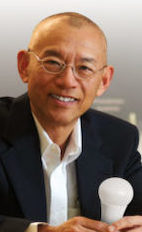Ellis Yan was 12 years old in 1966 when the China cultural revolution began, and the schools immediately began teaching less math and science and focused on political thought. A few years later Ellis was shipped off to a labor camp with nine other teenagers where he worked seven days a week on a diet consisting mostly rice. Monthly they ate pork.
Fast forward to the present time where Ellis is the CEO of TCP Lighting with several factories and distribution centers in China. Given his history and presence in our industry, he is one of the most knowledgeable voices regarding China in our industry.
Today, Ellis hosted an online event with Lesley Matt, Senior VP and Paul Speero, Director of Luminaires. The group focused the talk on current events in China and how those events are affecting our industry. This was the first session of a two-part series and the conclusion will be held Thursday, 30 JUL.
Ellis explained that he reads U.S. and Chinese papers daily so he listens to all sides. In this talk, Ellis gave the industry a stark warning about events in China and how they are already affecting lighting. He starts the discussion informing his audience of current events. Below are a few of the takeaways from the discussion (the audio on my laptop wasn’t great and I tried to paraphrase their comments for brevity):
- More than 90% of lighting is made China.
- The U.S. government shutdown the Chinese embassy in Houston giving them 72 hours to vacate. The Chinese quickly returned the favor and shut down the U.S. embassy in Chengdu, also giving our diplomats 72 hours to leave.
- Secretary of State Mike Pompeo gave a speech at the Nixon Library last week laying out what happened since President Nixon opened relations with China in 1972. Ellis paraphrased Pompeo saying that If we don’t get ourselves together and stop their aggression, they will take us over.
- Two U.S. carriers are now in the South China Sea conducting exercises. Lesley says naval exercises are common. Ellis says they are not common in the South China Sea. Ellis stated that China said the South China Sea belongs to China several years ago and not many people challenged it. Now China is building islands out of nowhere and establishing a military base. There are several islands and they are 1000 miles away from mainland China. All of a sudden, last week, the U.S. Government declared that Chinese position is illegal.
- There is a bill in the U.S. House of Representatives right now, authorizing the President to defend Taiwan if Taiwan is challenged by China.
- On July 1st, mainland China began enforcing the security law in Hong Kong. There used to be one country, two systems and Hong Kong enjoyed its own autonomy. China began enforcing the security law—which, according to Ellis, is a complete take over. Period. If anyone, after July 1st, is in Hong Kong, and they say anything against China, they can potentially be arrested and sent to China. Ellis explained that the law is retroactive so if a person said something negative in 1985, and there was proof, that person could be arrested in Hong Kong today and sent to China.
- Hong Kong has lost its Most Favored Nation status, first from Australia and then from the U.S. Ellis explained that Hong Kong has become another Shanghai, or Shenzhen, just another Chinese city controlled by Mainland China.
- China has very strong propaganda capability, so the people of China are being told what to do and how to feel in a different way now. They are taught that America is not our friend anymore. When people are being told that, the environment changes.
- Ellis explained that TCP has people there, and the people used to be friendly but now, they are not able to express what they feel. The control of the Chinese people is extremely powerful.
- Lesley explained that Americans used to go to China and shop their design with four or five factories. The factories will give a tour, take you to dinner and get you drunk and then you pick your factory. Ellis used to travel to China at least monthly and sometimes twice per month but has no plans to go for the next couple of years.
- Ellis complained about how much more difficult it is to do business over Zoom even when he owns the Chinese factories that he is working with. He emphasized that given the state of relations that communications and lead times will be slowed.
- Ellis cautioned against using WeChat, which is TCP’s everyday communication tool, because everything said on WeChat is monitored.
- The development cycle will change as well as the supply chain. It used to take 90 days to get a new product to the market, now they have to add a few more months.
- When the virus hit, the Chinese started making masks and charged 3 times the normal price—they didn’t really care that people were suffering.
- In the early days of the pandemic, the U.S. slowed down and a lot of U.S. companies cancelled orders or delayed shipments, sticking Chinese vendors with inventory. That created a a chain reaction because the China OEMs had to pay their vendors for inventory.
They drew no conclusions, so we can draw no conclusions. I discussed the call with long-time source Howard Wolfman who said, “It was almost as if they were putting out the bait and come back Thursday to learn more and see what is the conclusion.”




